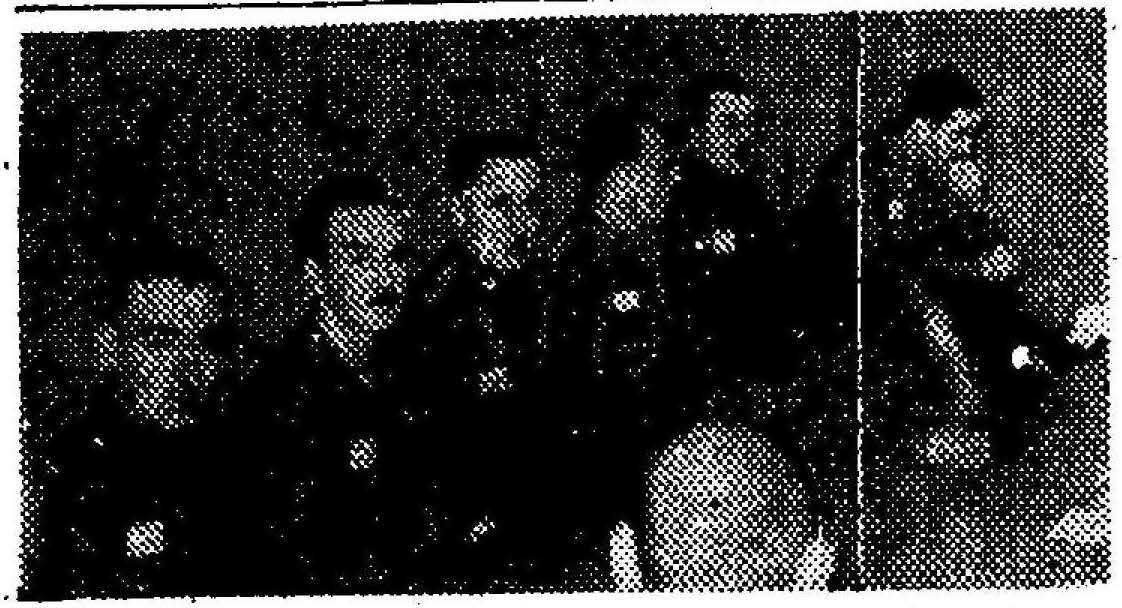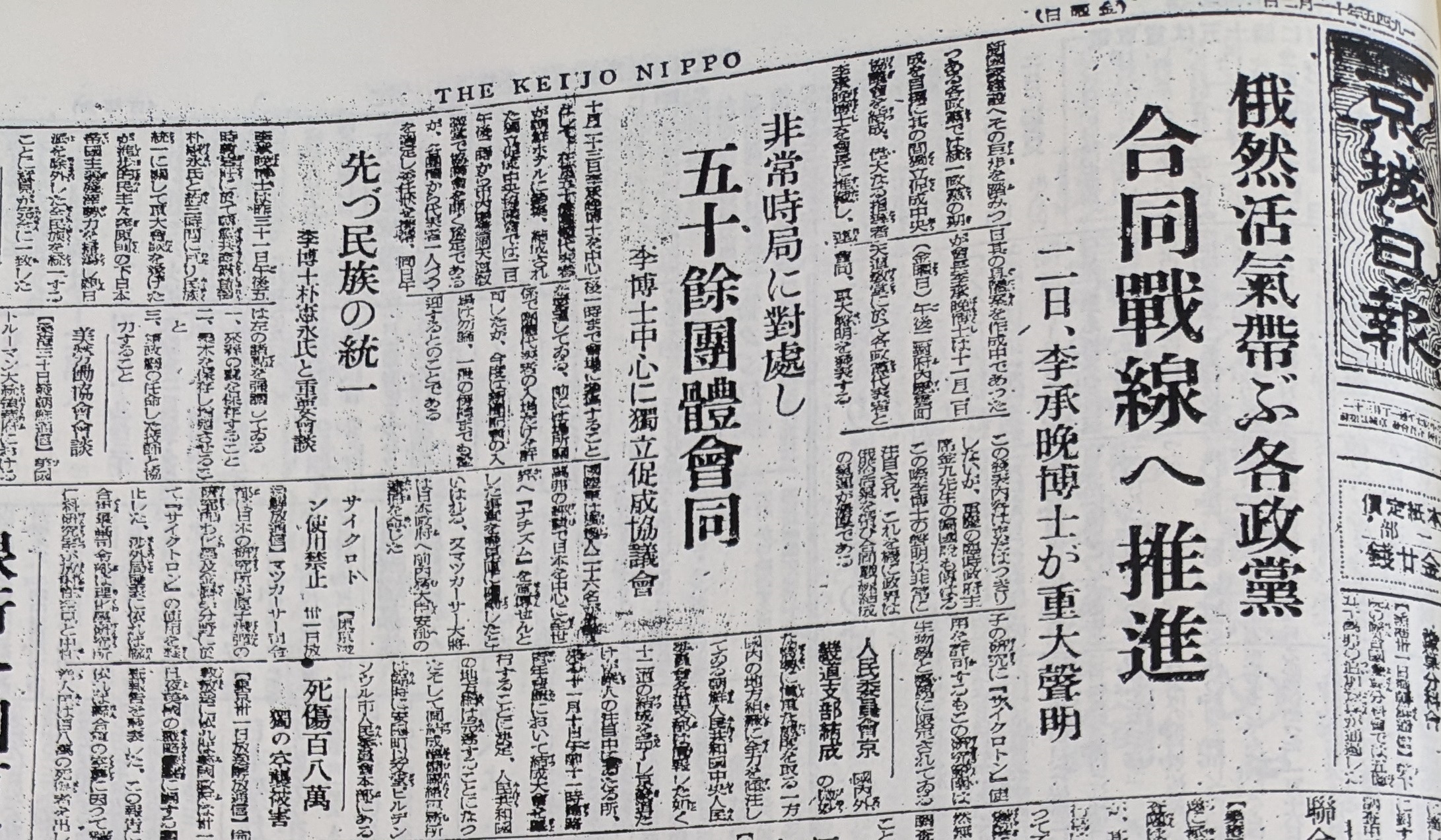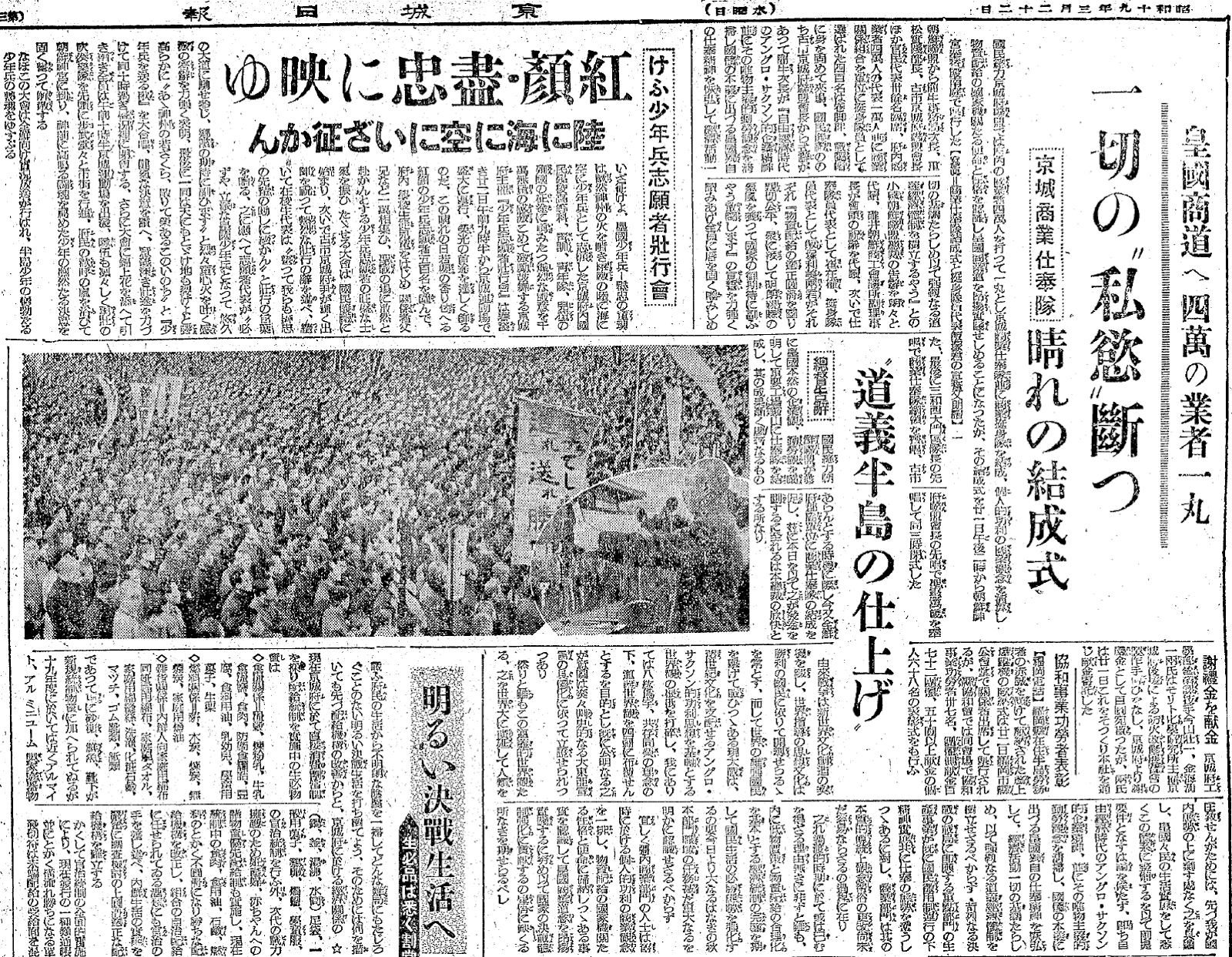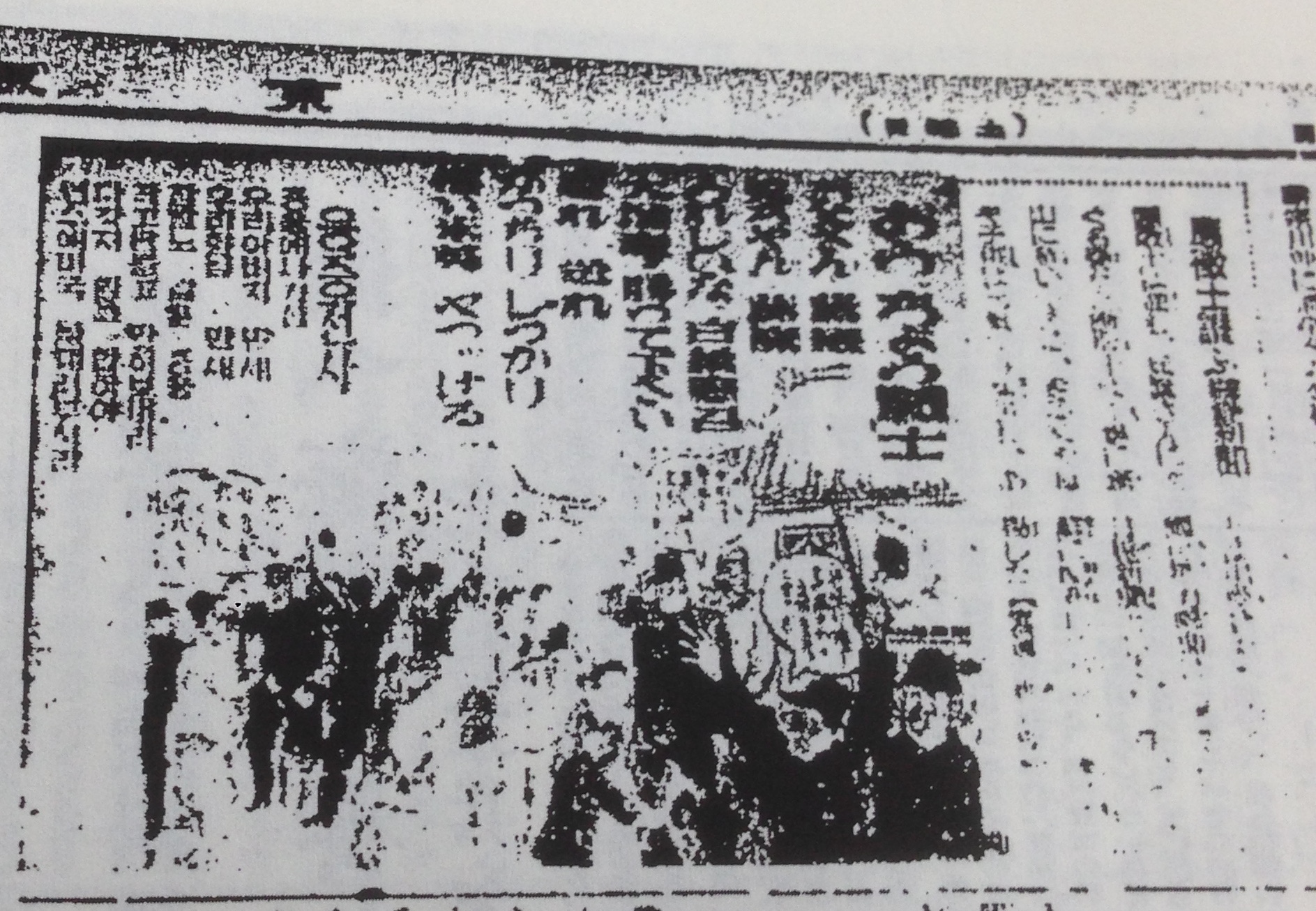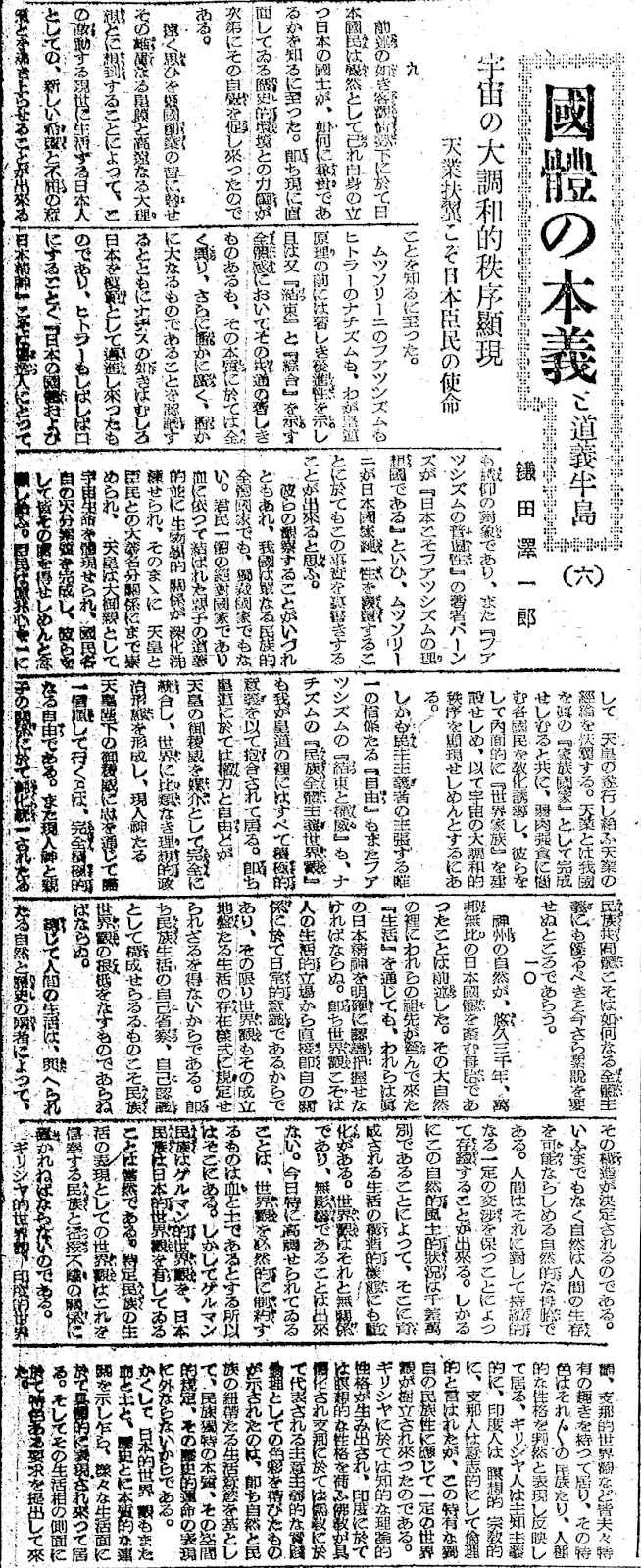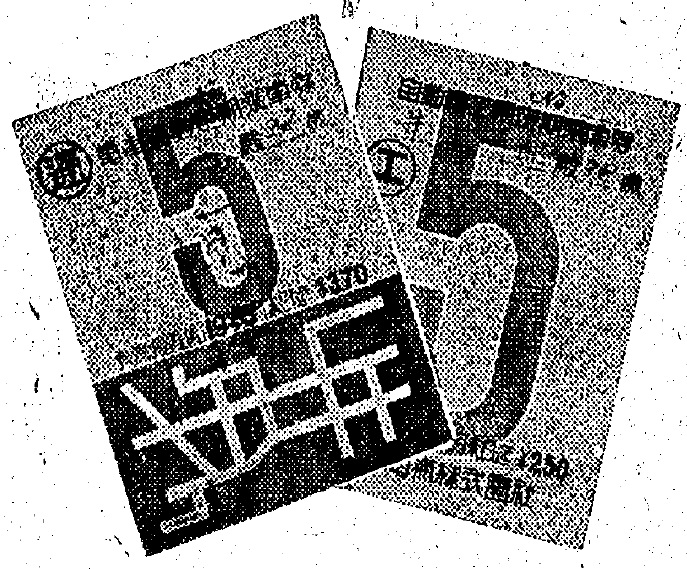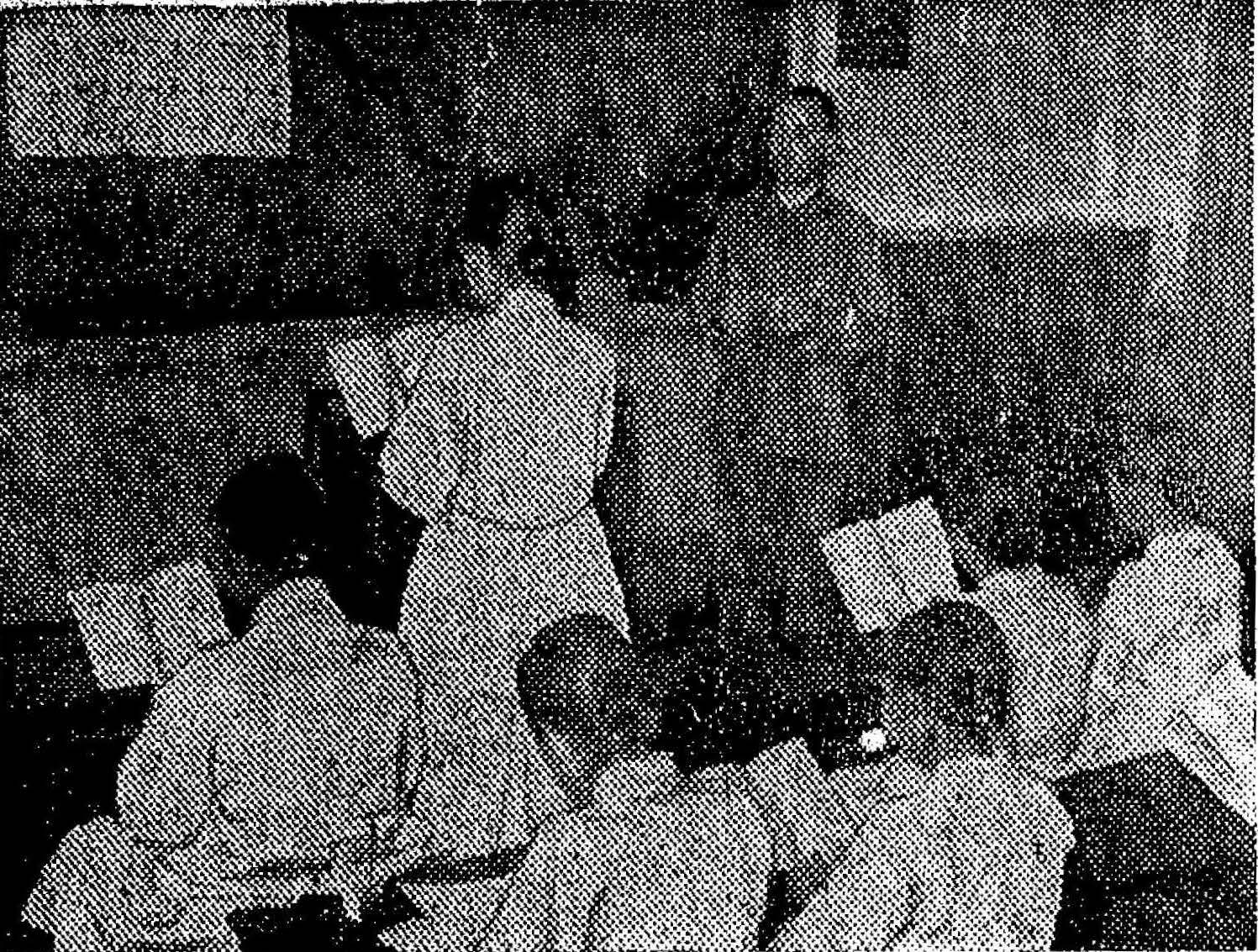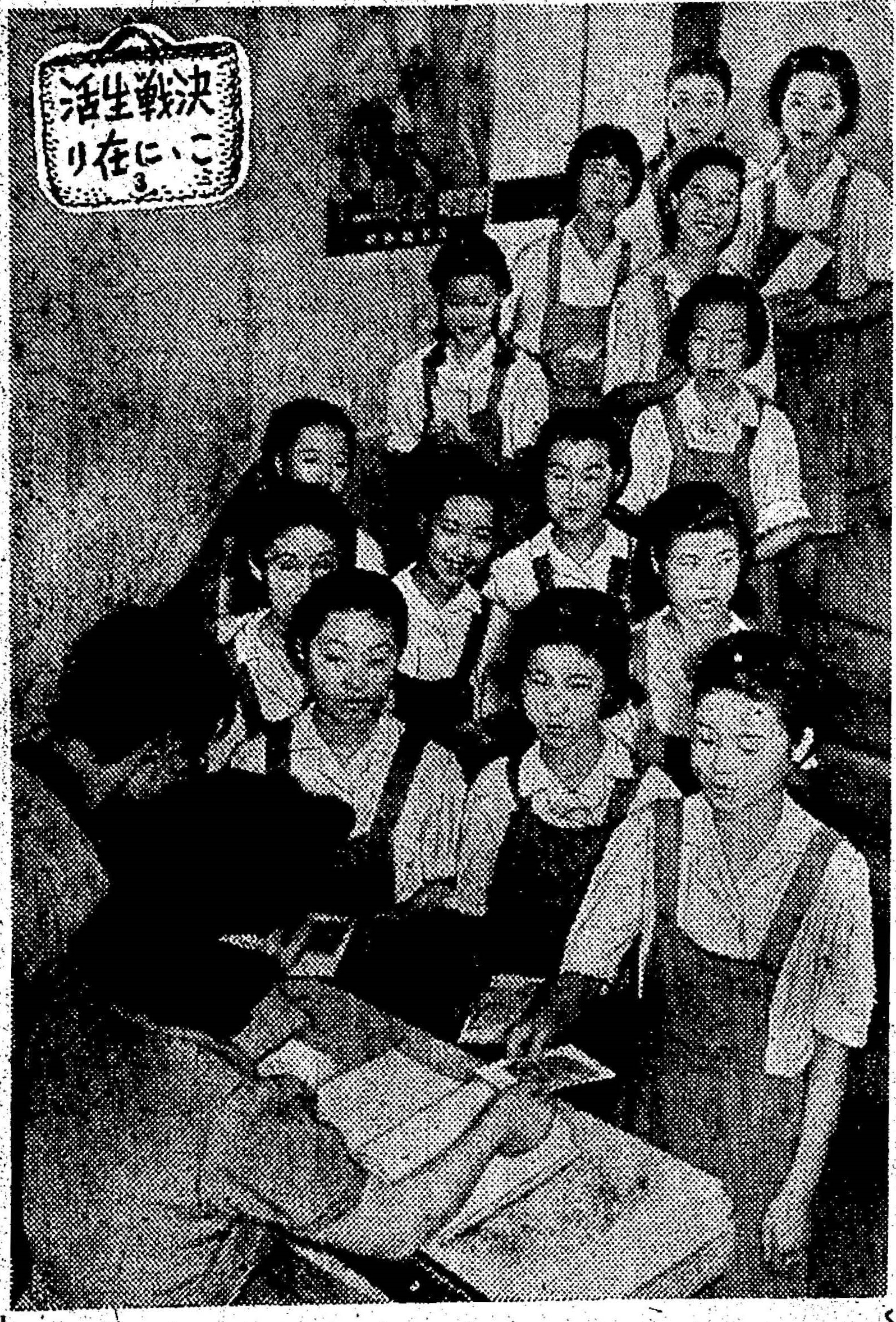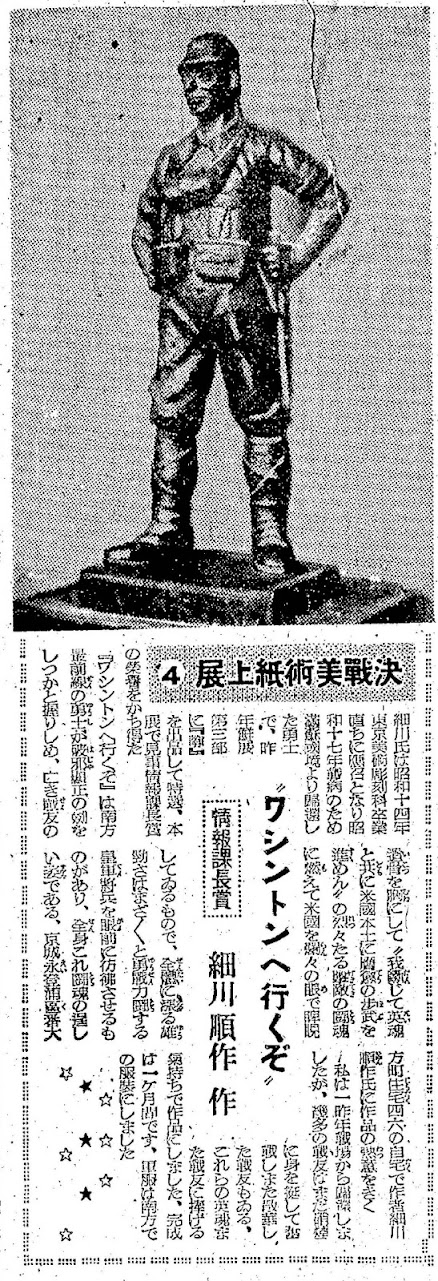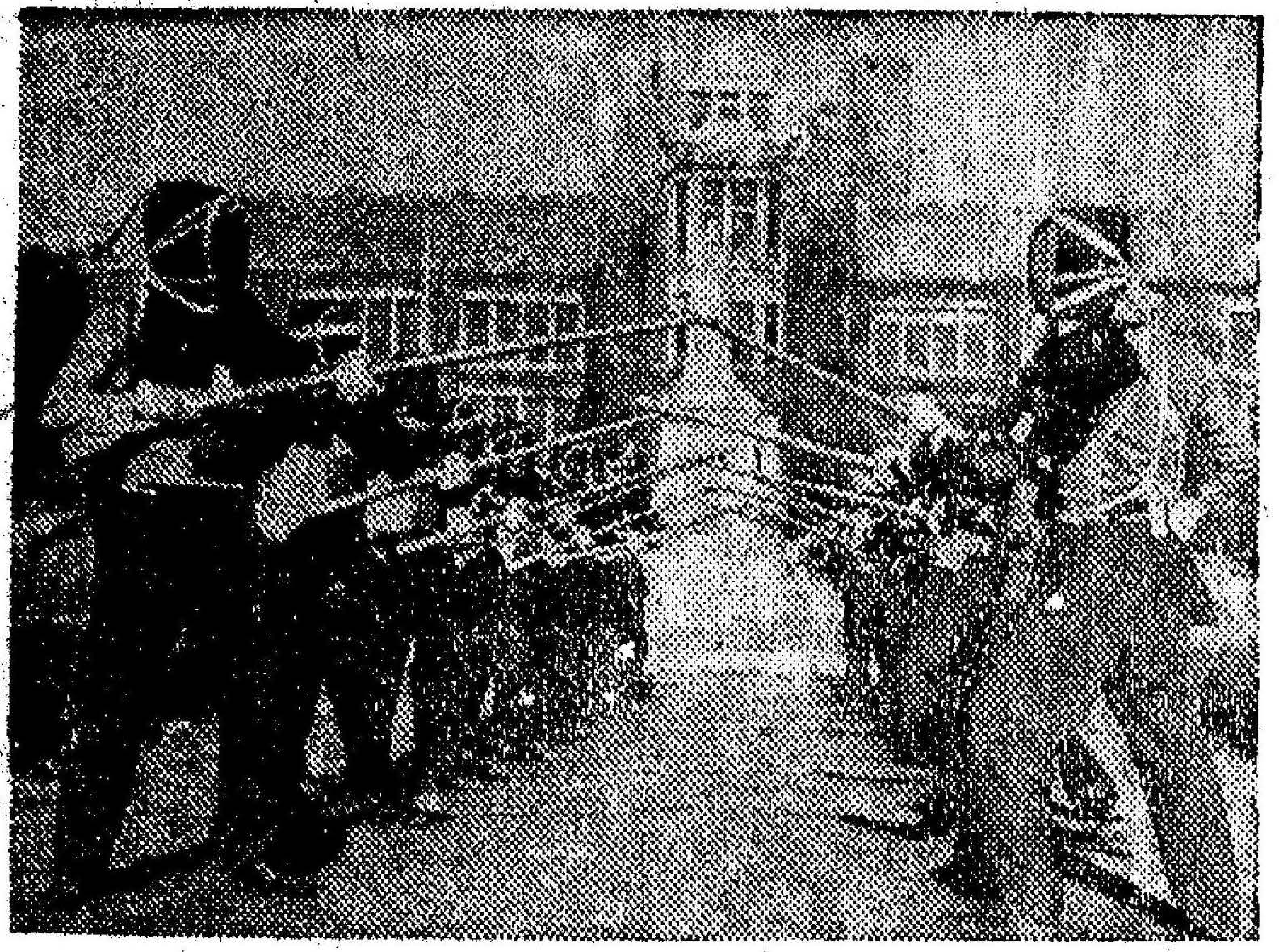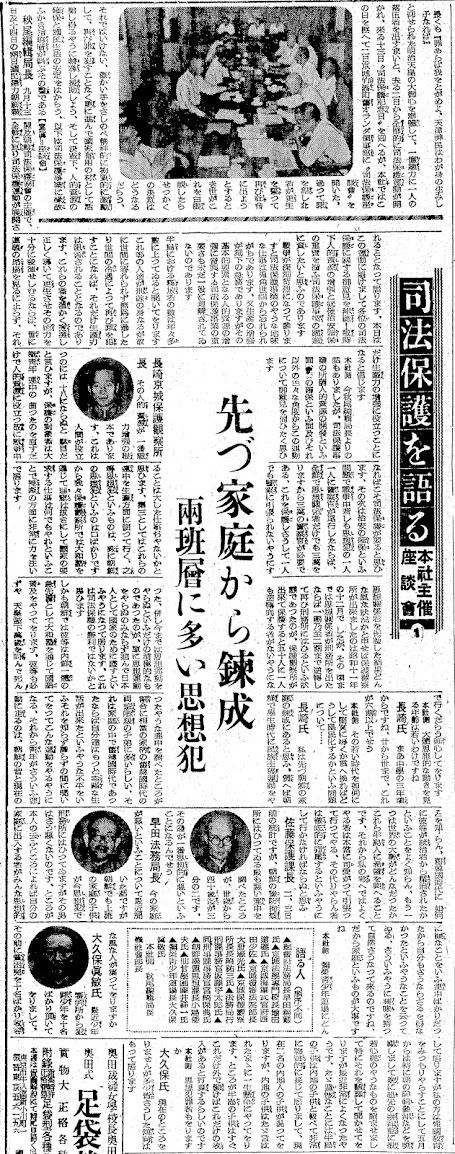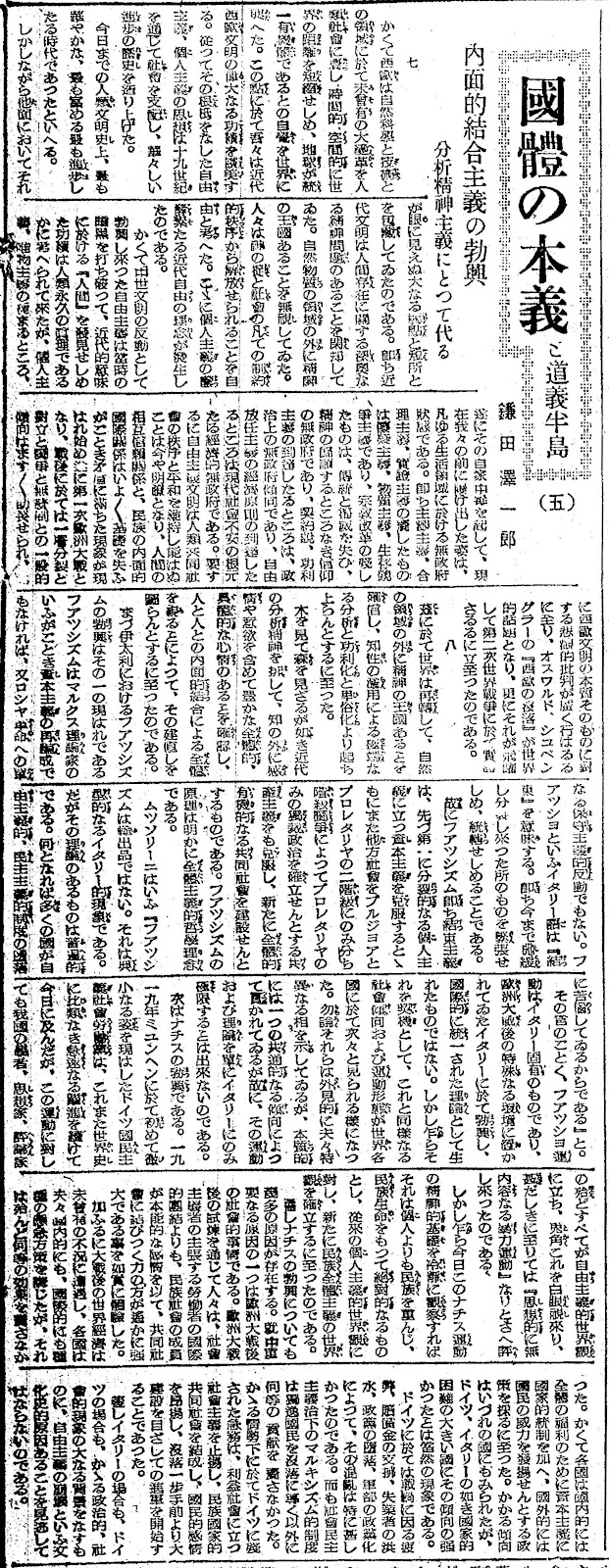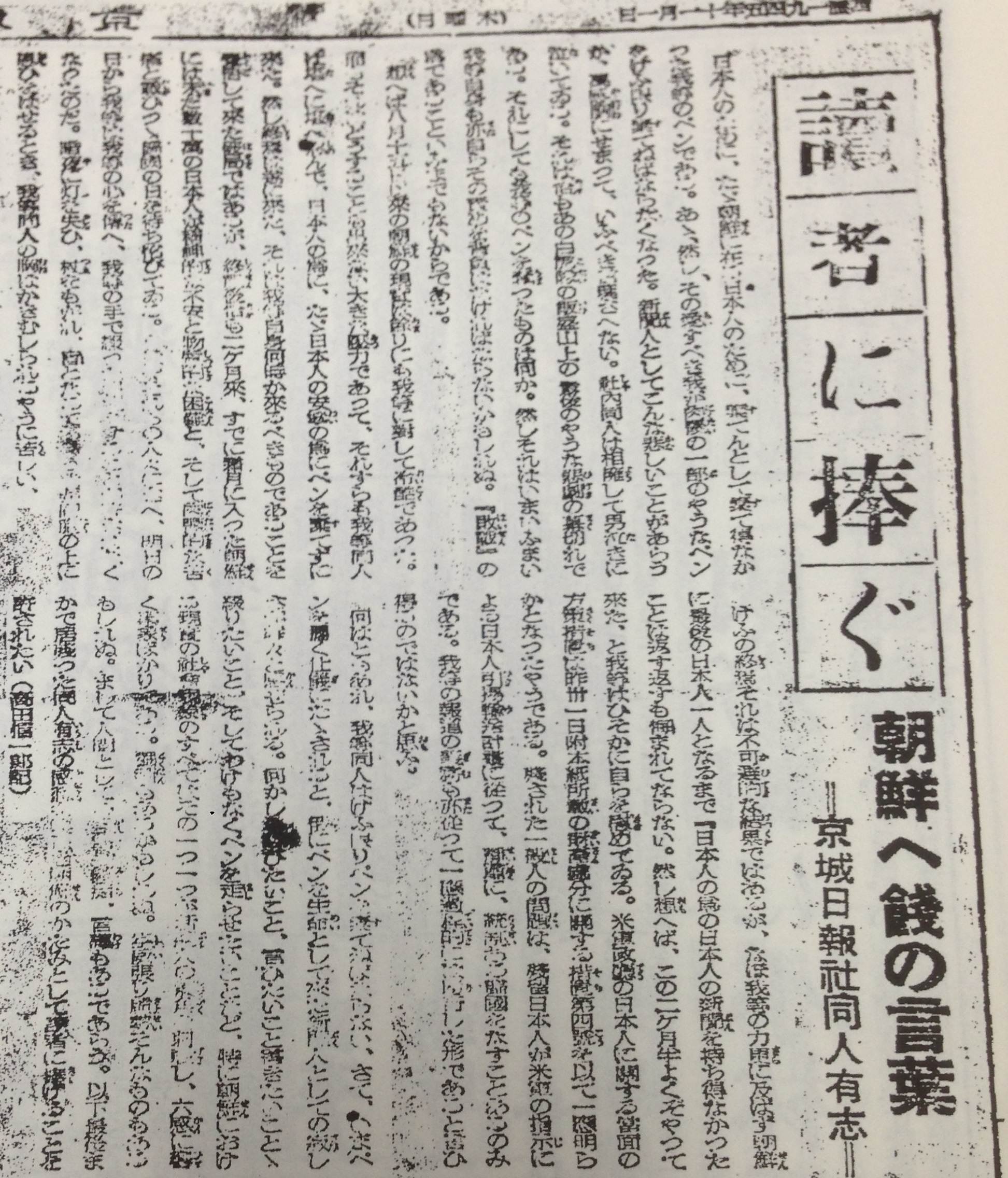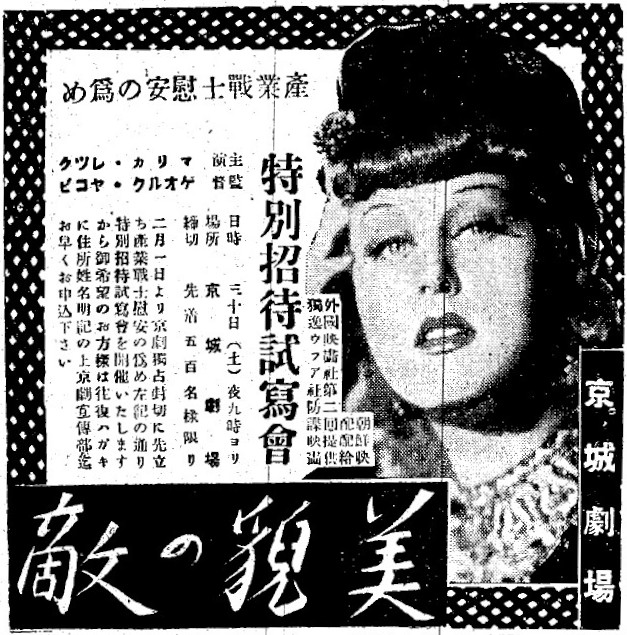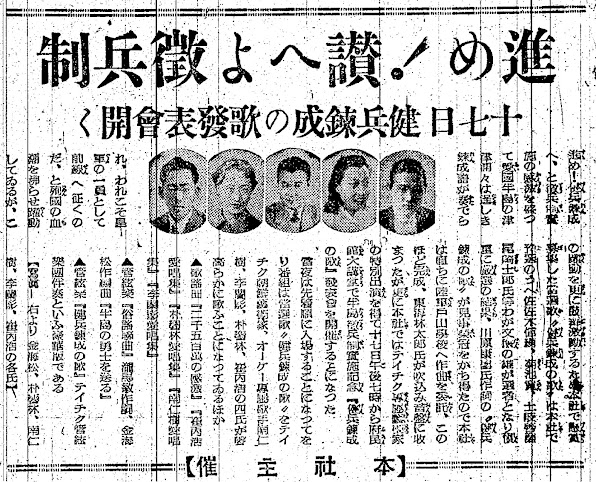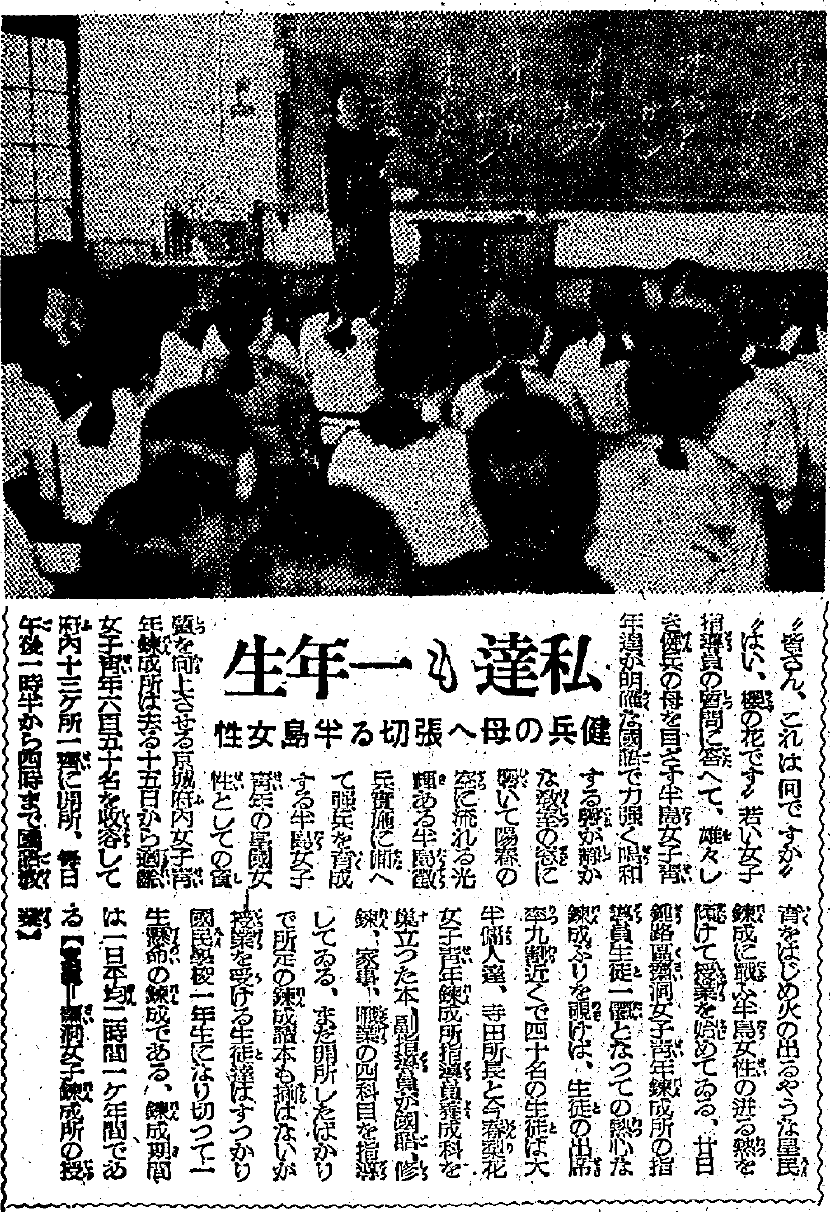Korean father carrying remains of his Imperial Army son in 1944 was upset his hometown ignored him and didn’t line up to salute his son like they did in Japan; colonial officials were ordered to show bereaved families proper respect or else the Koreans might start asking, ‘What did my son die for?’
This is a typical piece of what I might call a ‘stunned Korean’ propaganda story – a Korean travels to mainland Japan for the first time and is stunned by how ‘superior’ Japan is compared to Korea. Articles covering the trips of Korean comfort women to mainland Japan also follow a similar pattern. Given the similarities of these flattering comments to each other, we could surmise that the interviewed Koreans already knew what kinds of answers the colonial interviewers were expecting to hear.
(Translation)
Gyeongseong Ilbo (Keijo Nippo) April 26, 1944
The key is sincere service
Let’s follow the example of veterans aid in mainland Japan
During the week of veterans aid, we must extend a helping hand to the families of fallen soldiers and to the wounded soldiers to sincerely provide them with warm support, so that they no longer have to worry about the future. We should be pleased to know that Korea, which is known as a patriotic peninsula, contributes a considerable amount of money to the military towards the national defense fund. However, why are contributions to the veterans fund so small in comparison?
When a ritual to honor orphans of veterans families was held at the Seoul National Protection Shinto Shrine, there were only a few visitors excluding the staff members. It was a lonely affair for the head of the train station to receive the remains of the second-class heroes who were born on the Korean peninsula. Herein lies the problem that we must reflect on and wipe out our mistakes. The Korean peninsula must become a “home for soldiers,” a place of honor for many, by implementing conscription starting this year. This is definitely not someone else’s problem.
Veterans aid is not something that can be solved with money and material goods, but rather with sincere service and heartfelt support. During the week of veterans aid, writer Nobuyuki Tateno, who happened to be in Korea to cover the biography of a Korean second-class special volunteer soldier, sent the following heartrending memoir to the Korea Armed Forces Press Department on March 24. It is a piece of writing that those in leadership positions must read along with those in training to provide veterans aid. [Photo: Mr. Tatsuno].
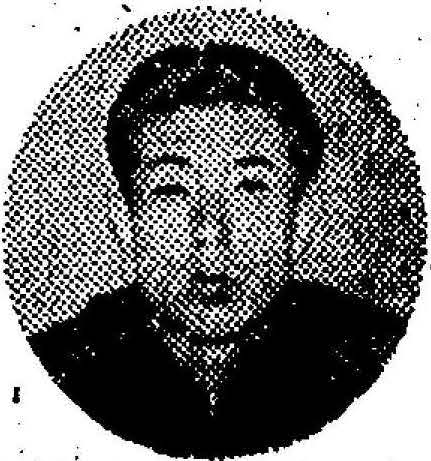
Mr. Nobuyuki Tateno’s Memoir
It was on November 21 of last year that the family of Private Captain Moon Am (문암/文岩), who had been honored to serve as a second-class hero, was notified by his original unit via the myeon township office that they should come to retrieve his remains. His hometown was Sinbu-myeon, Seoncheon-gun, Pyeonganbuk-do. It was a Sunday, and there was no one at the township (myeon) office or at the county (gun) office. So they were at a loss as to what to do. No one was willing to accompany them.
Although Captain Moon Am’s father, Hang-jun (항준/恒俊), was a poor farmer, he had graduated from Normal School (elementary school) in the old days and could speak Japanese. So he decided to go by himself without relying on anyone. He took the 12 o’clock train that night, accompanied by his wife, Gok-on (곡온/曲媼), who could not speak Japanese, and a younger son who was still in the sixth grade at National School (elementary school). Even though he could speak Japanese, it was Hang-jun’s first time in mainland Japan. When he thought about going all the way to [redacted], he was anxious about the difficulties that they would face along the way.
After spending one night in Busan, they boarded the ship and each received two loaves of bread for lunch. When Hang-jun saw that his younger son was hungry on the ship, he shared a loaf of his own bread with him, while he himself made do with only a small loaf of bread. When they arrived in Shimonoseki in the evening, they were getting hungrier and hungrier. But as they were trying to figure out where to go to eat, two soldiers whom he had met on the ship took pity on them. Apparently, they were soldiers from [redacted] who were going back to their original unit. The soldiers took the child and his mother to Shimonoseki to look for food.
In the meantime, Hang-jun watched their luggage, including the soldiers’ luggage. Even though he had nothing to eat, the soldiers’ simple kindness touched his heart so deeply that he forgot about his hunger. After a while, the soldiers returned with his wife and child. It appeared that they had found food with difficulty. With some guidance from the soldiers, Hang-jun and his family took the train again, and changed trains at Osaka station.
However, the child became hungry again, so they got off the train at Tsuruga to get some food. They walked all over Tsuruga in search of food, but were unable to find any in the unfamiliar city. So, they got on the train again. A middle-aged Japanese woman, who kindly gave them a seat on the train, saw Gok-on in her Korean clothes and asked her, “Where are you going, and to do what?”
Hang-jun told her that they were actually going to their deceased son’s original unit in [redacted] to pick up his remains. The lady said, “Oh, I see,” and got up and bowed politely to Hang-jun and his family with a reverent look on her face and said, “Thank you for your hard work”.
Mr. Hang-jun was struck by this. The ladies in mainland Japan, even the ordinary ladies in the third-class cars, were so polite and respectful, and their attitudes were also admirable. He plainly felt, this is why Japan is so strong in war.
In the morning, soon after dawn, he looked out the window of the train and saw a farmer’s wife in the rice paddy, wearing a white hand towel on her head and harvesting rice around the field. Hang-jun tugged on his wife Gok-on’s sleeve and said,
“Look! All the women in mainland Japan work like that from early in the morning, doing the work that men do. Japan is strong in war, because their women are so diligent. Compared to this, what have the women of the Korean peninsula been doing? Only the men go out to work in the fields, while the women are playing around indoors. This is a disgrace! Unless all the women in Korea learn from the women in mainland Japan, Korea will not improve.”
For two days, Hang-jun and his family ate almost nothing. However, Hang-jun was filled with pride when he saw for the first time that the customs in mainland Japan were not in the least bit disorderly. Instead, they were orderly, calm, and composed, even in the midst of a fierce war. He felt so much pride about it that he even forgot that he was hungry. From Hang-jun’s perspective, it was also astonishing that not a single policeman was to be found patrolling at any of the train stations in mainland Japan.
When they turned up at their deceased son’s original unit, they were given proper accommodation, and Hang-jun and his family were able to relax there for the first time. After receiving his deceased son’s remains and being escorted off, Hang-jun and his family were loaded into a second-class train car and started their return trip home. When changing trains in Osaka and Shimonoseki, the stationmaster led the way. The stations in Osaka and Shimonoseki were crowded with people. However, when Hang-jun carried his deceased son’s remains, led by the stationmaster, the crowd quickly split to the left and right, and everyone stopped and saluted at the same time. Even the military officers stopped and saluted, and the police patrol officers also saluted.
Hang-jun was amazed to see such controlled and dignified salutes in mainland Japan. Although his son had died, he did not regret it in the slightest. He felt a sense of pride in his heart, knowing that his son had given his life honorably as a Japanese national and as a Japanese soldier to His Majesty the Emperor. Mr. Hang-jun held on to this pride until he arrived at the train station in his hometown of Seoncheon.
But what did he see at the train station? He had sent a telegram, did he not? Or perhaps he had typed the telegram incorrectly? There no one who greeted him at the train station, and the foot traffic was disordered and crowded as usual. Not only did the crowds not make way for Hang-jun, who was carrying his deceased son’s remains in his arms, but Hang-jun was pushed into the crowd and crushed mercilessly. Seeing the ignorant and disorderly crowd, Hang-jun said,
‘Why are the people of the Korean peninsula so backward?’, finally coming to this realization and crying out in shame. As Hang-jun just realized then, the people of the Korean peninsula are still very backward.
So what should we do when their remains arrive? What should we do for the families of the deceased soldiers? We must take them by the hand and patiently explain things to them so they understand. I don’t know whether the Governor-General’s Office or the Korean Federation of National Power will come up with a concrete plan, but we must come up with a plan as soon as possible and put it into action.
In particular, provinces (do), counties (gun), towns (eup), and townships (myeon) must take action. Otherwise, the pride that Hang-jun felt in his heart when he went to receive his son’s remains would be distorted in some strange way. The pride that Hang-jun held in his heart is precious. He has truly gained this pride by losing his son, by having his son’s blood spilled.
In particular, conscription is being implemented on the Korean peninsula, and there are many young men who are currently undergoing their draft examinations, eager to become second-class soldiers. It is clear that in the near future, there will be many dozens, or even thousands of second-class soldiers like Captain Moon Am. In view of this, the Governor-General’s Office, the provinces, and the Federation must be fully informed of the actual situation, and provide guidance to the counties and townships regarding the proper way to interact with the honorable bereaved families of fallen pioneer second-class soldiers. This is a major task that requires urgent attention.
It would be a problem if the bereaved families were to have even the slightest doubt so as to ask, ‘What did my son die for?’. There are still no plans to build ‘loyal soul’ monuments to the three captains whom I have accompanied.
(Written while staying in accommodations in Seoul on April 24th)
Source: https://www.archive.org/details/kjnp-1944-04-26
(Transcription)
京城日報 1944年4月26日
要は”真心の奉仕”
見倣おう内地の軍援
援護週間に銃後は出征陣没勇士の遺家族に、傷痍軍人に熱き援護を誠を尽くし、後顧の憂いを断つ奉仕救援の手を差しのべねばならない。愛国半島の名を謳われる朝鮮が軍への国防献金が相当額に達しているのは喜ぶべきではあるが、これに引き較べて恤兵金の少ないのはどういうことであろうか。
さきに京城護国神社で初の遺児社頭対面の儀が行われた際、係員のほかは参者の数は少々たるものであったこと。半島が生んだ二階級特進の勇士の遺骨を迎える駅頭の淋しかったこと。ここに幾多反省して過ちを拭わねばならぬ問題がある。半島も今年から徴兵制の実施に依って数多誉れの”兵の家”となるのである。断じて人ことではない。
軍援は物と金で解決されるものではなく、真心の奉仕、真心の援助こそが要請されるのだ。軍援週間に当り、たまたま半島特別志願兵二階級特進勇士の伝記取材のため、来鮮中の作家立野信之氏は二十四日朝鮮軍報道部に左の如き胸うたれる手記を寄せて来た。指導の地位に立つ者軍援の訓練にともに聴かねばならぬ一文である。【写真=立野氏】
立野信之氏手記
二階級特進の栄に輝く文岩兵長(平北宣川郡新府面)の遺族の許に原隊から遺骨を受け取りに来るようにとの通知が面事務所を通じてあったのは、昨年の十一月二十一日。恰度その日は日曜日で、面事務所にも郡庁にも誰も人が出て居らない。それでどういう処置を取ったらいいか分からないで、まごついた。だれもついて行ってやろうとする者もない。
文岩兵長の父親の恒俊さんは貧農だが、昔の普通学校を出ているので、国語は出来る。そこで誰も頼らずに、自分で行くことにした。そしてその晩の十二時の汽車で、国語の出来ない妻の曲媼さんとその時まだ国民学校の六年生であった兵長のすぐ下の男の子とをつれて出掛けた。しかし国語が出来るといっても、恒俊さんは内地は初めてである。それも遠い〇〇まではるばる行くことを思うと、途中の難儀が思われて不安であった。
釜山で一泊して、弁当にパンを二筒づつ貰い船に乗った。船の中で次男が腹をすかしているのをみかねて、恒俊さんは自分のパンを一筒子供に分けてやり、自分は小さいパン一筒で我慢をした。夕方下関へ着いたが、益益腹が減って仕方がない。しかしどこで食事をしていいのか分からず、まごまごしていたら、船の中で知り合った二人の兵隊~やはり〇〇の兵隊で、原隊へ帰るのだといっていたが見兼ねて、子供と母親をつれて、下関の町の方へ食物をさがしにつれて行ってくれた。
恒俊さんは自分達の荷物と兵隊の荷物を預かって番をしていた。自分は何も食べなくとも兵隊の質朴な親切が身に沁み腹が一杯であった。暫くして兵隊は妻と子供をつれて帰ってきた。どうやら苦労して食物にありついたのである。恒俊さん達は、その兵隊に教わってまた汽車に乗り、大阪で乗り換えた。
しかしまた子供が腹をすかしたので、食物を得るために敦賀で下車してしまった。敦賀じゅうを食物をさがして歩いたが、馴れない街では結局食べ物を得られなかった。そしてまた汽車に乗った。すると汽車の中で親切に座席をあけてくれた内地人の中年のおかみさんが朝鮮服姿の曲媼さんを見て、『あなた方は何処まで何しに行くのか』ときいた。
そこで恒俊さんが、実はこれこれで、〇〇の原隊まで遺骨を受け取りに行くのだ、と話した。するとそのおかみさんは『ああそうですか』と言って、起ちあがり敬虔な面持で恒俊さん達に向かって丁寧に頭をさげて『ご苦労さまです』と言った。
恒俊さんは胸を打たれた。内地の婦人は、三等車に乗っている普通のおかみさんですらこのように礼儀正しく、態度も立派である。これだから日本は戦争に強いのだと淡々感じた。
そして朝、夜が明けて間もなく汽車の窓から見ると、田圃には百姓のおかみさんが白い手拭をかぶって点々と稲こぎをしている姿が認められた。恒俊さんは妻の曲媼さんの袖をひいて、いった。
『見なさい。内地の女は、皆ああして朝早くから男のやる仕事をしている。女がこんなにも勤勉だから日本は戦争に強い。これに比べて今まで半島の女は何をしていたか。男だけが野良へ出て働き、女はみな内房でゴロゴロ遊んでいたじゃないか。恥ずかしいことだ。朝鮮中の女がみな内地の女を見習うようにならなければ、朝鮮はよくならない』
二日間、恒俊さん達は殆ど何にも食べなかった。だが恒俊さんは、はじめて見た内地の風物が激しい戦争の最中だというのに、少しも乱れず、整然としていて、むしろ余裕綽々たる有様に胸が一杯で、別にひもじいとも思わなかったのである。そういう恒俊さんの眼には、内地の駅々に巡査の姿が一人も見当たらぬということもまた驚異であった。
原隊に出頭して見ると、宿舎もちゃんと取ってあり、そこではじめて恒俊さん達は寛ぐことができた。遺骨を受け取り、見送られて、こんどは二等車に乗せられて帰路についた。大阪や下関で乗り換えの時、駅長が先導してくれた。大阪や下関の駅は人で目まぐるしいほどの雑沓である。しかし恒俊さんが駅長に先導されて遺骨を抱えて行くと、雑沓している群衆はサッと左右に分かれて、皆一斉に立ち停まって敬礼をする。将校までが立ち停まって敬礼してくれた。巡査も敬礼する。
恒俊さんは内地の、その統制ある奥ゆかしい礼譲を目の当りに見て、感嘆した。息子を死なしたが、少しも惜しくはない。いや日本国民として、日本兵氏として立派に陛下に生命を捧げたのだという誇りが胸に湧いたのだった。恒俊さんはその誇りを故郷の宣川の駅に降り立つまで堅く待ちつづけてきた。
だが、宣川駅で見たものは何であったか。電報を打って置いたのに。或いは打ち方が悪かったかも知れぬが。出迎えの人は見当たらず、相変わらず統制のない雑沓ぶりで、遺骨を抱えた恒俊さんに道をあけようともしないばかりか、恒俊さんは遺骨を抱えたまま群集の雑沓の中に押し込まれて、もみくちゃにされてしまったのだった。その無智と無統制な群集を見て、恒俊さんは、
『わが半島の民度はこんなにも後れているのか』と今更に気づき、情けなくて涙が流れた。恒俊さんが悟った如く、半島の民度はまだまだ非常に低い。
それだけに、遺骨がきた時にはどうすべきか。軍人遺家族に対してはどうすべきか。噛んでふくめるように手を取って教えなければならぬ。それの具体案は総督府が立てて実行するのか、総力聯盟がやるのか知らぬが、ともあれ早々に案をたてて実行に移さなければならぬ。
殊に道、郡、邑、面は身を以ってそれに当らなければならぬ。さもないと、恒俊さんが内地へ遺骨を受け取りに行って、胸の中に確固として抱いてきた『息子は陛下のお役に立った』『これで日本人になれた』という誇りは、妙な所でひき歪められてしまう。恒俊さんが胸に抱いてきた誇りは尊いものである。息子を失い、息子の血を流させて如実に得たものである。
殊に半島では今度徴兵が実施され、二階級特進の兵につづかんの熱意に燃える壮丁が、現に徴兵検査をうけつつある。もっとも近き将来に第二の文岩兵長が何人、何十人、何千人と出るだろうことは明かである。それを思うとき、先駆者たる二階級特進の栄ある軍人遺族に対する対し方というものは、総督府なり、道なり、聯盟なりが充分実情を知らして面や郡を指導しなければならぬ。これは火急を要する大きな仕事である。
遺族に『伜は何のために死んだのか』という疑いを少しでも抱かせたら問題である。私が歩いた三人の兵長のところでは、まだ忠魂碑を建てる計画さえも無かった。
(四月二十四日京城の宿舎にて記す)

